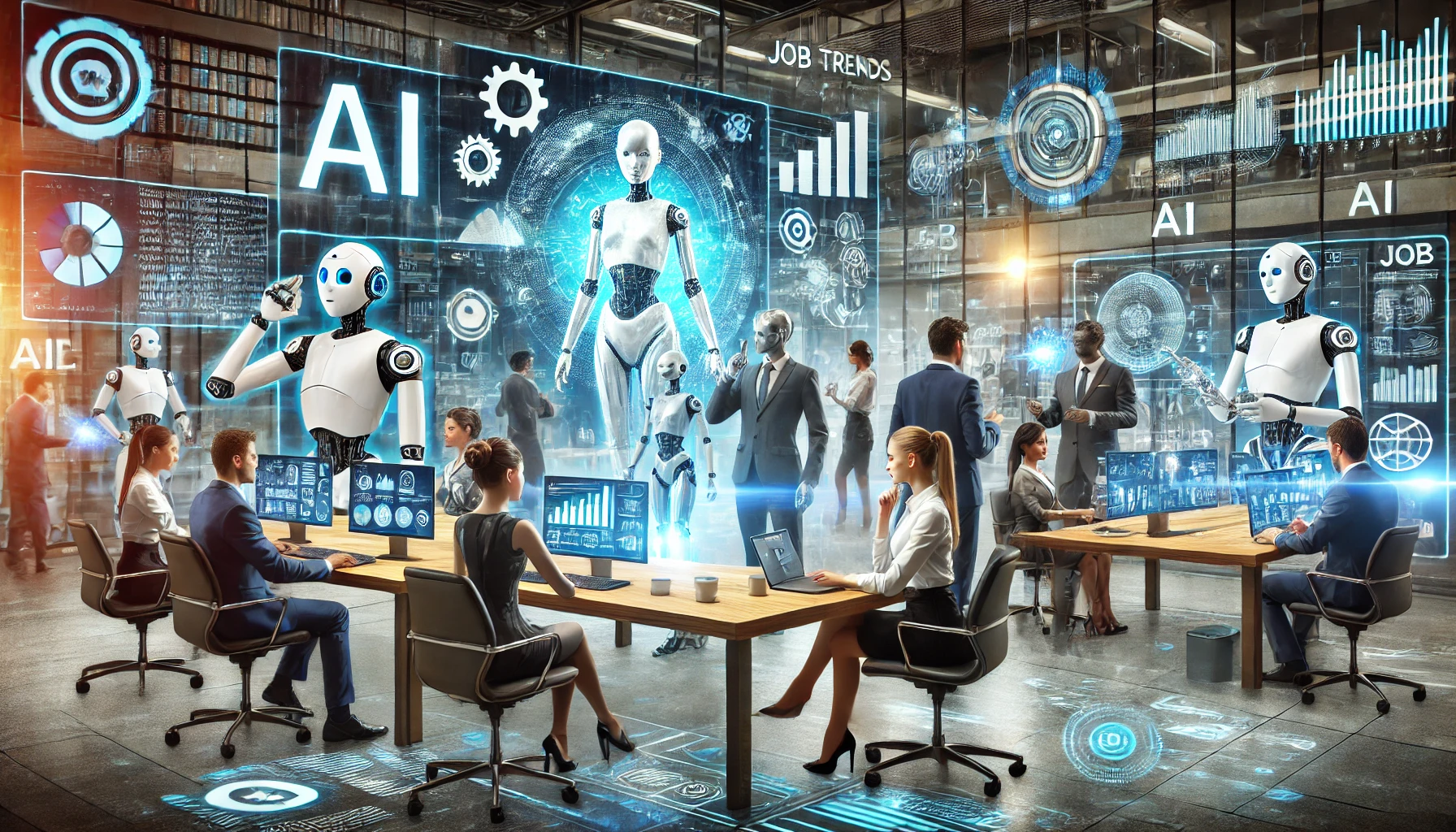Artificial Intelligence (AI) is no longer a futuristic concept—it is actively reshaping industries and redefining the job market. From automation and enhanced decision-making to new job opportunities, AI is changing the way people work and businesses operate. While some fear AI will replace human jobs, others see it as a tool for productivity and innovation.
In this article, we’ll explore how AI is transforming the job market, the opportunities it creates, and how professionals can adapt to this evolving landscape.
1. AI and Job Automation: The Reality
One of the biggest concerns about AI is job displacement. Many repetitive and rule-based tasks are being automated, especially in industries such as manufacturing, customer service, and logistics.
- Manufacturing: AI-powered robots and automated systems are streamlining production lines, increasing efficiency, and reducing human error.
- Retail & Customer Service: AI-driven chatbots and virtual assistants handle customer inquiries, reducing the need for large support teams.
- Transportation & Logistics: Self-driving vehicles and AI-powered logistics systems optimize delivery routes and warehouse management.
Will AI Completely Replace Human Jobs?
While automation is eliminating some jobs, it is also creating new roles that require human skills, such as problem-solving, creativity, and emotional intelligence. Rather than replacing workers, AI is transforming job functions, allowing employees to focus on higher-value tasks.
2. AI as a Productivity Booster
AI is not just about replacing jobs—it is also making workers more productive. Many industries use AI to automate time-consuming tasks, allowing employees to focus on strategic and creative work.
Examples of AI-Driven Productivity Gains
- Healthcare: AI helps doctors analyze medical data, diagnose diseases, and personalize treatments.
- Marketing & Sales: AI tools analyze customer behavior, optimize advertising campaigns, and automate content creation.
- Finance: AI algorithms detect fraudulent transactions, manage investments, and improve financial planning.
By handling repetitive work, AI enables professionals to focus on innovation, strategy, and customer relationships.
3. Emerging Job Opportunities in the AI Era
While AI is automating some jobs, it is also creating entirely new career paths. Companies need skilled professionals to develop, manage, and improve AI technologies.
Top Careers in the AI-Powered Job Market
- AI & Machine Learning Engineers – Develop AI models and algorithms.
- Data Scientists – Analyze big data to improve AI decision-making.
- AI Ethics Specialists – Ensure AI systems operate fairly and responsibly.
- Cybersecurity Analysts – Protect AI-powered systems from cyber threats.
- AI Trainers – Teach AI systems to improve their accuracy and efficiency.
With AI expanding across industries, demand for these roles is growing rapidly.
4. How to Adapt and Stay Relevant in an AI-Driven Job Market
To stay competitive, professionals must develop skills that complement AI rather than compete with it. Here are some key strategies:
Develop AI-Resistant Skills
Some skills cannot be easily replicated by AI, including:
- Critical thinking & problem-solving – AI can analyze data but struggles with complex decision-making.
- Emotional intelligence & creativity – Human interaction and innovation remain essential.
- Adaptability & lifelong learning – Keeping up with new technologies ensures job security.
Learn AI and Data Skills
Understanding AI can make professionals more valuable in any industry. Consider learning:
- Programming languages like Python and R (for AI development).
- Data analysis and visualization tools (such as SQL, Tableau, and Power BI).
- AI applications in your field (e.g., AI-driven marketing, AI-powered finance).
Leverage AI as a Career Tool
Rather than fearing AI, professionals can use it to boost their careers. AI-powered tools can help with:
- Automating routine tasks.
- Enhancing decision-making with data insights.
- Personalizing customer experiences.
By embracing AI, professionals can improve their efficiency and marketability.
5. The Future of Work: AI and Human Collaboration
The future of work is not about humans vs. AI—it’s about humans working with AI. Companies that successfully integrate AI with human expertise will lead the market.
How Companies Are Combining AI and Human Skills
- AI-assisted creativity: AI generates design ideas, but human designers refine and enhance them.
- AI-driven decision support: AI provides insights, but human leaders make the final calls.
- AI-powered collaboration: AI tools automate scheduling and communication, improving teamwork.
Rather than replacing humans, AI is becoming a powerful assistant, helping workers be more efficient, creative, and innovative.
Final Thoughts: Embrace AI, Don’t Fear It
AI is transforming the job market, but it is not the enemy. While automation is changing some roles, AI is also creating new opportunities and increasing productivity across industries. The key to success in this new era is adaptability—learning AI skills, developing human-centric abilities, and leveraging AI as a tool for career growth.
By embracing AI rather than resisting it, professionals can thrive in the future of work.
